#of the plains of antioch
Explore tagged Tumblr posts
Text
seven emperors gather on a stolen plain
feet soft on the marble tile
they wriggle and squirm
their life of breaking gigantic boulders, crushing mountains, and leveling towers has filled their silk robes with sand and salt
so they itch
“i have an idea”, they said, “let us place a corn finals and grain of sand in the pocket of our enemy. let them stir and fester, grow, and tear themselves asunder while we sleep”
and as the decades spun, they looked upon their work with pride
“O new Antioch! O bright Edessa! the golden city covered in a sheen of plastic!”
and their spreadsheets filled with tally after tally of iron and fire
yet even as the weight of the numbers pinned them beneath their silver robes and porcelein halls, they itched still.
but their feet had dug lines in the stone. they dared not cross for fear of tumbling into each other.
now the winds rise and flow through the gaps in the mountains they destroyed.
the sand and salt swirls in their eyes
they stumble and lean
and now there’s a real possibility
of them all falling down
at once
13 notes
·
View notes
Text
An Excerpt from the Aberdeen Bestiary
I've started preparing the bestiaryposting, and have encountered one entry that doesn't really fit into what we're doing. Not only is it one of the longest entries, but instead of "let me tell you about this animal", it's taking more of a "we all already know about this animal, so I'm going to share some stories about specific ones" approach. But out of a sense of completionism, I can't just not post it, so here you go.
Dog
The Latin name for the dog, canis, seems to have a Greek origin. For in Greek it is called cenos, although some think that it is called after the musical sound, canor, of its barking, because when it howls, it is also said to sing, canere. No creature is more intelligent than the dog, for dogs have more understanding than other animals; they alone recognise their names and love their masters.
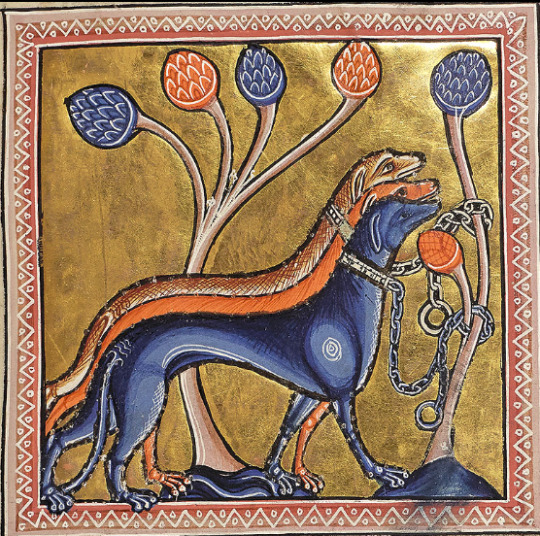
There are many kinds of dogs: some track down the wild beasts of the forests to catch them; others by their vigilance guard flocks of sheep from the attacks of wolves; others as watch-dogs in the home guard the property of their masters lest it be stolen by thieves at night and sacrifice their lives for their master; they willingly go after game with their master; they guard his body even when he is dead and do not leave it. Finally, their nature is that they cannot exist without man.
Also of the nature of dogs
We read that dogs have such great love for their masters, as when King Garamentes was caught by his enemies and taken into captivity, two hundred dogs went in formation through enemy lines and led him back from exile, fighting off those who resisted them. When Jason [Licio] was killed, his dog rejected food and died of starvation. The dog of King Lysimachus threw itself in the flame when its master's funeral pyre was lit and was consumed by fire along with him. When Apius and Junius Pictinius were consuls, a dog that could not be driven away from its master, who had been condemned, accompanied him to prison; when, soon afterwards, he was executed, it followed him, howling. When the people of Rome, out of pity, caused it to be fed, it carried the food to its dead master's mouth. Finally, when its master's corpse was thrown into the Tiber, the dog swam to it and tried to keep it from sinking.
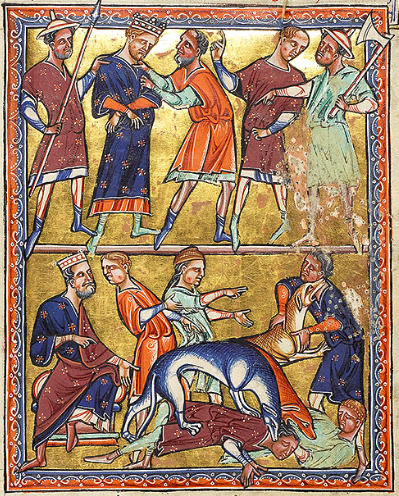
When a dog picks up the track of a hare or a deer and comes to a place where the trail divides or to a junction splitting into several directions, it goes to the beginning of each path and silently reasons with itself, as if by syllogism, on the basis of its keen sense of smell. 'Either the animal went off in this direction,' it says,'or that, or certainly it took this turning.’
Again on the nature of dogs
Often, also, when a murder has been committed, dogs have produced clear evidence of the guilt of the accused, with the result that their unspoken testimony is for the most part believed. They say that at Antioch, in a distant quarter of the city at dusk, a man was murdered, who had his dog with him on a lead. A soldier had been the perpetrator of the deed, with robbery as his motive. Undercover of the growing darkness, he fled elsewhere. The corpse lay unburied; the crowd of onlookers was large; the dog stayed at its master's side, howling over his sad fate. It happened that the man who had committed the crime, acting confidently in order to convince people of his innocence - such is the cunning way in which men think- joined the circle of onlookers and, feigning grief, approached the corpse. Then the dog, briefly abandoning its doleful lament, took up the arms of vengeance, seized the man and held him, and, softly singing a pitiful song, as in the epilogue of a tragedy, moved everyone to tears; and the fact that the dog held that man alone, of the many that were there, and did not let him go, lent weight to its case. In the end, the murderer was at a loss because the evidence in the case was so plain; he could not clear himself by objecting that he was the victim of anyone's hate, enmity, envy or spite, and he could no longer rebut the charge. Because it was very difficult for him, he suffered punishment, because he could offer no defence.
A dog's tongue, licking a wound, heals it. A dog's way of life is said to be wholly temperate. A puppy's tongue is generally a cure for internal injuries. It is characteristic of a dog that it returns to its vomit and eats it again. If a dog swims across a river carrying a piece of meat or anything of that sort in its mouth, and sees its shadow, it opens its mouth and in hastening to seize the other piece of meat, it loses the one it was carrying.

In some ways preachers are like dogs: by their admonitions and righteous ways they are always driving off the ambushes laid by the Devil, lest he seize and carry off God's treasure - Christian souls. As the dog's tongue, licking a wound, heals it, the wounds of sinners, laid bare in confession, are cleansed by the correction of the priest. As the dog's tongue heals man's internal wounds, the secrets of his heart are often purified by the deeds and discourse of the Church's teachers. As the dog is said to be temperate in its ways, the man who is set over others diligently studies wisdom and must avoid drunkenness and gluttony in every way, for Sodom perished in a surfeit of food. Indeed, there is no quicker way for the Devil, his enemy, to take possession of man than through his greedy gullet. The dog returning to its vomit signifies those who, after making their confession, heedlessly return to wrongdoing. The dog leaving its meat behind in the river, out of desire for its shadow, signifies foolish men who often forsake what is theirs by right out of desire for some unknown object; with the result that, while they are unable to obtain the object of their desire, they needlessly lose what they have given up.
Some dogs are called licisici, wolf-hounds, because they are born of wolves and dogs, when by chance these mate. In India bitches are tethered at night in the forests to breed with wild tigers, by whom they are mounted, producing very fierce dogs, so strong that with their grip they can pull down lions.
#maniculum bestiaryposting#dog#medieval literature#medieval art#medieval manuscripts#illuminated manuscript
157 notes
·
View notes
Photo

The Journeys of Paul the Apostle
The journeys of Paul the Apostle, as the New Testament relates in the Book of Acts, started with his conversion experience on the way to Damascus, after which instead of seeking to thwart the growing Christian movement, he helped spread it. His four journeys by land and sea across great lengths of the Mediterranean and over vast expanses of land in Asia and Europe totaled over an estimated 16,000 km (10,000 mi).
The Journeys of Paul the Apostle, c. 55 CE
Simeon Netchev (CC BY-NC-ND)
Paul's First Missionary Journey
After persecution in Jerusalem, Antioch was one of the places to which Christians fled, and it was from there Paul began his first missionary journey. Annexed by Pompey the Great in 64 CE and made the Roman provincial capital of Syria, with an estimated population of 250,000, Antioch was one of the primary cities of the East, along with Alexandria and Constantinople. Located at the northeast end of the Mediterranean on the Persian Royal Road, Antioch benefited from its location at the end of the Silk Road and its proximity to Greece, Anatolia, and Italy. As Hughs and Jones mention, not only was "its wealth derived from being a center of civil, military, and later ecclesiastical administration of much of the Near East but also from its position on the commercial road from Asia to the Mediterranean" (103).
Besides its own wine and olive oil production and as a center for the fulling of cloth products, silk from China, lapis lazuli from Afghanistan, dye-works from the Levant, and weaved silk from Damascus could all have found their way through Antioch for distribution throughout the northern Mediterranean areas. As it lay on the Orontes River and at the edge of a fertile plain, Antioch communicated commercially with the harbor of Seleucia 26 km (16 mi) downstream on the Mediterranean. As common travelers in ancient times hitched their rides on merchant vessels, the water portion of Paul's trip was aboard a cargo ship performing trade transactions. Thus, it was at Seleucia that Paul boarded a cargo ship to the province of Asia, stopping at the island of Cyprus.
Cyprus, with a prominent location at the eastern end of the Mediterranean, was also known for its wine and olive oil production. A scenario for trade would have been a combination of Eastern goods loaded alongside refined and agricultural products accumulated at Antioch. Then, with a stop at Cyprus for partial distribution, Cyprus' products would have been added for final distribution in Asia.
With fellow evangelist Barnabas and Barnabas' nephew, John Mark, Paul first landed at Salamis on the eastern end of Cyprus after leaving the port city of Seleucia and sailing west toward Asia. Like with many of his subsequent stops, Paul first visited the local synagogue, attempting a conversion of the Jews to Christianity. From Salamis, heading west, walking nearly the length of Cyprus, Paul and Barnabas came to Paphos, their point of departure for Asia. At Paphos, the proconsul Sergius Paulus would become a convert.
Paul the Apostle's First Missionary Journey (c. 46-48 CE)
Simeon Netchev (CC BY-NC-ND)
Heading to Asia from Cyprus, Paul's ship stopped at Perga in Pamphylia, in southwestern Turkey today. From Perga, John Mark departed for Jerusalem as Paul and Barnabas pressed on into Asia. At their first stop in Antioch of Pisidia, at the synagogue, Paul preached the history of Israel as he weaved in the story of John the Baptist and Jesus of Nazareth, said to be a descendant of David, as the resurrected Savior, son of God. Though Paul and Barnabas initially gained Jewish and Gentile converts, a faction of opposing Jews expelled them from the city.
At Iconium, with similarly mixed results on learning of a plot to kill them, Paul went on to Lystra. As many in Lystra were worshipers of gods and their idols, Paul preached they should turn from worshiping "things" to worshiping the "living God" (Acts 14:15). When some hostile Jews came from Antioch and Iconium and won the crowd over, both groups stoned Paul. Thinking he was dead, they dragged Paul to the outskirts of the city. When some brethren came to retrieve the body, remarkably Paul had recovered and went back into town. The next day, Paul traveled east for Derbe. With his mission ending on a more positive note, large numbers rallied at Derbe to Paul's message. Deciding to head home, retracing their steps through Lystra, Iconium, and Antioch, after appointing elders in each church, the apostles went on to Perga; then, after preaching there a bit, they boarded a ship for a short junket west to the port city of Attallia, then from there they sailed back to Seleucia, then traveled up along the Orontes to Antioch.
Continue reading...
17 notes
·
View notes
Text



Daily Scripture Readings and Lives of the Saints for Saturday, May 24, 2025
Feasts and Saints celebrated today:
Symeon the Stylite of the Mountain
Saint Vincent of Lerins
Meletios the Commander & his Companion Martyrs
Gregory, Archbishop of Novgorod
Readings for today:
Acts of the Apostles 15:35-41
John 10:27-38
Symeon the Stylite of the Mountain
Reading from the Synaxarion:
Saint Symeon, the "New Stylite," was born in Antioch; John his father was from Edessa, and Martha his mother was from Antioch. From his childhood he was under the special guidance of Saint John the Baptist and adopted an extremely ascetical way of life. He became a monk as a young man, and after living in the monastery for a while he ascended upon a pillar, and abode upon it for eighteen years. Then he came to Wondrous Mountain, and lived in a dry and rocky place, where after ten years he mounted another pillar, upon which he lived in great hardship for forty-five years, working many miracles and being counted worthy of divine revelations. He reposed in 595, at the age of eighty-five years, seventy-nine of which he had passed in asceticism.
Apolytikion of Symeon the Stylite in the First Tone
Thou becamest a pillar of patience and didst emulate the Forefathers, O righteous one: Job in his sufferings, Joseph in temptations, and the life of the bodiless while in the body, O Symeon, our righteous Father, intercede with Christ God that our souls be saved.
Kontakion of Symeon the Stylite in the Second Tone
Desiring the heights, thou wast translated from the earth; thy pillar was made a second Heaven by thy toils; by it, thou didst shine with the splendour of great wonders, O righteous one. And thou ever prayest to Christ the God of all in behalf of all of us.
The content on this page is under copyright and is used by permission. All rights reserved. These works may not be further reproduced, in print or on other websites or in any other form, without the prior written authorization of the copyright holder:
Reading (c) Holy Transfiguration Monastery - Brookline, MA
Apolytikion of Symeon the Stylite (c) Holy Transfiguration Monastery, Brookline, MA
Kontakion of Symeon the Stylite (c) Holy Transfiguration Monastery, Brookline, MA
Saint Vincent of Lerins
Reading from the Synaxarion:
Saint Vincent was born in Toul in Gaul; he was the brother of Saint Lupus, Bishop of Troyes, who was a companion of Saint Germanus of Auxerre. Saint Vincent was first a soldier, then left the world to become a monk of the renowned monastery of Lerins, where he was also ordained priest. He is known for his Commonitorium, which he wrote as an aid to distinguish the true teachings of the Church from the confusions of heretics; his most memorable saying is that Christians must follow that Faith which has been believed "everywhere, always, and by all." He wrote the Commonitorium about the year 434, three years after the Third Ecumenical Council in Ephesus, which he mentions in the Commonitorium, and defends calling the holy Virgin Theotokos, "She who gave birth to God," in opposition to the teachings of Nestorius which were condemned at the Third Council.
Without identifying by name Augustine, Bishop of Hippo, Saint Vincent condemns his doctrine of Grace and predestination, calling it heresy to teach of "a certain great and special and altogether personal grace of God [which is given to the predestined elect] without any labour, without any effort, without any industry, even though they neither ask, nor seek, nor knock" (Commonitorium, ch. XXVI). See also Saint John Cassian, February 29; Saint John Cassian wrote his refutations before, and Saint Vincent after, the condemnation of Nestorius at the Third Council in 431, and the death of Augustine in 430. Saint Vincent reposed in peace about the year 445.
Apolytikion of Saint Vincent of Lerins in the Fourth Tone
With wisdom hast thou made plain to all the Orthodox Faith as that which alone hath been believed and honoured by all men, always and everywhere, also showing heresy to be innovation, groundless and unstable as a gust in a tempest. O Vincent, thine invincible prayers shelter the Church of God.
The content on this page is under copyright and is used by permission. All rights reserved. These works may not be further reproduced, in print or on other websites or in any other form, without the prior written authorization of the copyright holder:
Reading (c) Holy Transfiguration Monastery - Brookline, MA
Apolytikion of Saint Vincent of Lerins (c) Holy Transfiguration Monastery, Brookline, MA
Prayer Before Reading Scripture
Shine within our hearts, loving Master, the pure light of Your divine knowledge and open the eyes of our minds that we may comprehend the message of Your Gospel. Instill in us also reverence for Your blessed commandments, so that having conquered all sinful desires, we may pursue a spiritual life, thinking and doing all those things that are pleasing to You. For You, Christ our God, are the light of our souls and bodies, and to You we give glory together with Your Father who is without beginning and Your all holy, good, and life giving Spirit, now and forever and to the ages of ages. Amen.
Epistle Reading
The Reading is from Acts of the Apostles 15:35-41
IN THOSE DAYS, Paul and Barnabas remained in Antioch, teaching and preaching the word of the Lord, with many others also. And after some days Paul said to Barnabas, "Come, let us return and visit the brethren in every city where we proclaimed the word of the Lord, and see how they are." And Barnabas wanted to take with them John called Mark. But Paul thought best not to take with them one who had withdrawn from them in Pamphylia, and had not gone with them to the work. And there arose a sharp contention, so that they separated from each other; Barnabas took Mark with him and sailed away to Cyprus, but Paul chose Silas and departed, being commended by the brethren to the grace of the Lord. And he went through Syria and Cilicia, strengthening the churches.
Gospel Reading
The Reading is from the Gospel According to John 10:27-38
The Lord said to the Jews who came to him, "My sheep hear my voice, and I know them, and they follow me; and I give them eternal life, and they shall never perish, and no one shall snatch them out of my hand. My Father, who has given them to me, is greater than all, and no one is able to snatch them out of the Father's hand. I and the Father are one."
The Jews took up stones again to stone him. Jesus answered them, "I have shown you many good works from the Father; for which of these do you stone me?" The Jews answered him, "It is not for a good work that we stone you but for blasphemy; because you, being a man, make yourself God." Jesus answered them, "Is it not written in your law, 'I said, you are gods?' If he called them gods to whom the word of God came (and scripture cannot be broken), do you say of him whom the Father consecrated and sent into the world, 'You are blaspheming,' because I said, 'I am the Son of God'? If I am not doing the works of my Father, then do not believe me; but if I do them, even though you do not believe me, believe my works, that you may know and understand that the Father is in me and I am in the Father."
#christian blog#christian faith#christian living#christian quotes#christianity#orthodox#eastern orthodoxy#westvirginia#maryland#potomachighlands#ancient christianity#faith in jesus#orthodox christianity#holy orthodoxy#orthodox church#saints#holyscriptures#bible#western maryland#md#wva#cumberland#frostburg#keyserwv#Westernport Cresaptown
6 notes
·
View notes
Text
The legend of Adonis - canaanite mythology
The legend of Adonis
With the emergence of the Phoenicians at the beginning of the first millennium BC and the rise of coastal Lebanon, the legend of Baal was fading away in the plains and valleys, and in its place arose the legend of Adonis with a local rhythm and adjacent to the climates of Mesopotamia and the Nile.
The Canaanites called the god of Byblos “Adon,” meaning “master” or “Lord.” Adon is a Mesopotamia god of origin represented by the Sumerian Dumuzi and Babylonian Tammuz, the gods of pastures, fertility and beauty, who were linked in a love affair with the two goddesses: Inanna with Damuzi and Ishtar with Tammuz, and this love duo was the origin of love myths in the ancient world. Adon also has a symmetrical relationship with Osiris, the Egyptian god and his wife Isis, and the cult of Adonis traveled to Egypt and had a temple in the ancient city of Pharos “Alexandria”, and on the other hand, the legend of Osiris extended to the city of Byblos and he and his wife had a temple there. But Adon moved in the first millennium BC to the country of the Greeks and then the Romans and became called “Adonis”, while his beloved Astarte was compared to the Greek goddess Aphrodite (the Roman Venus) and we still lack the original Canaanite or Phoenician legend of the god Adon; but the Roman version of it is the one that has reached us, and it is on the tongue of the Roman poet Ovid. The worship of Adonis in Syria and Lebanon seems to have been relatively late, but we find a Greek reference to him in the fifth century BC. Documents speak of annual festivals held for him, with much weeping and wailing, in Athens and Alexandria under the Ptolemies (Ptolemy II), then in Byblos and Antioch around the second century AD, and his worship reached Rome around the first century BC.
To read the full article, click on this link
2 notes
·
View notes
Text
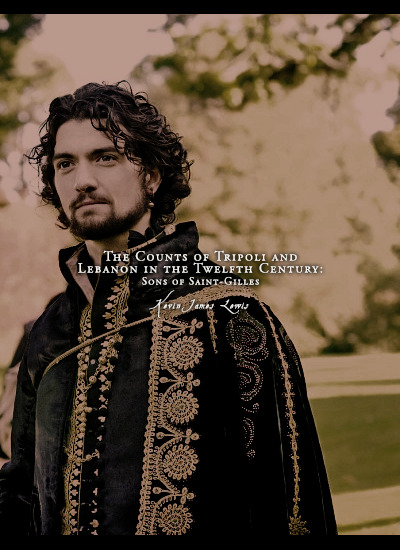
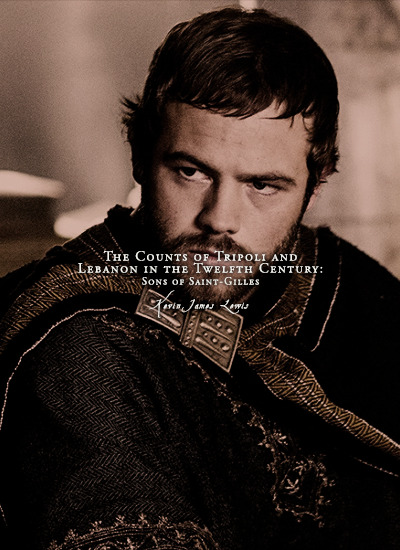

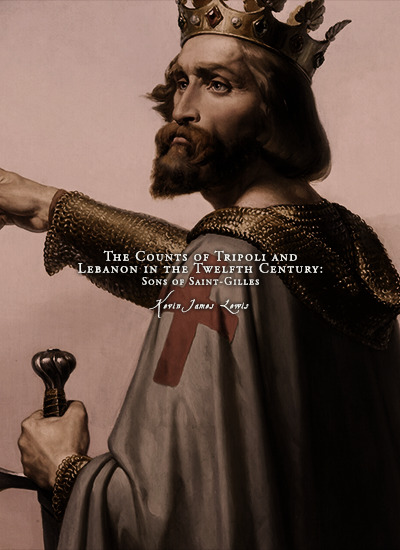


Favorite History Books || The Counts of Tripoli and Lebanon in the Twelfth Century: Sons of Saint-Gilles by Kevin James Lewis ★★★★☆
The Frankish county of Tripoli was not historically important, at least in the traditional sense. Its counts won no particularly great military victories beyond the conquest of the county itself and commissioned no great works of literature. The county’s archives were sacked in an epoch long past and their contents erased from history. Only paint flaking off forgotten church walls, once-mighty fortresses gutted by the fires of modern wars, and crumbling manuscripts in distant libraries stand testament to the fact that the county and its inhabitants existed at all. Yet the study of the county and its rulers is important in that it raises a number of hitherto unasked and unanswered questions regarding the development both of the so-called ‘crusader states’ and of Lebanon and Syria more generally. Though small, the county’s history encapsulates the principal forces that shook and shaped the Latin East as a whole. The county was not simply the product of European crusaders, but grew amid the verdant valleys of Lebanon, the forbidding heights of the Alawite mountains and the fertile plains that lay between. It was in this Syro-Lebanese context that the counts of Tripoli sought to establish their rule. In many ways, the manifold pressures on the counts were greater than those faced by other Frankish rulers. True, the threat of invasion seems to have been slighter because hostile forces preferred crossing the Jordan into the southern kingdom of Jerusalem, or the Orontes into the northern principality of Antioch, rather than over the mountains that cradled the county. However, the kings of Jerusalem and princes of Antioch did not face the same cultural complexity as in the Lebanon region, which made it all the harder for the counts to negotiate and enforce the terms of their power. … The present work is arranged chronologically and divided into five chapters. Chapter 1 focuses on two rulers: William Jordan of Cerdanya and Bertrand of Toulouse, rival claimants to what would become the county of Tripoli after the death of the crusader Raymond IV of Saint-Gilles and Toulouse in 1105. Chapters 2 and 3 concern the reigns of Count Pons and his son Raymond II respectively. Chapters 4 and 5 both deal with a single count: Raymond III, whose reign was by far the longest, arguably the most complex and easily the best documented – not to mention most debated. Raymond IV of Saint-Gilles himself, the first self-professed ‘count of Tripoli’, does not receive his own chapter or indeed much special attention at all beyond what is absolutely necessary for the purpose of setting the scene. It has been deemed wise to omit him from the present work since most of his life was spent in the west or else participating in the First Crusade at a time when the very existence of the county of Tripoli had yet to be imagined. As such, the structure of this present work questions Jean Richard’s influential belief that the county of Tripoli was primarily the product of Raymond IV’s ‘action personnelle’. More than one person determined the county’s existence and fate.
#historyedit#litedit#history books#house of toulouse#french history#lebanese history#syrian history#asian history#european history#history#medieval#nanshe's graphics
8 notes
·
View notes
Text
Were There Black People in Ancient & Medieval Europe?
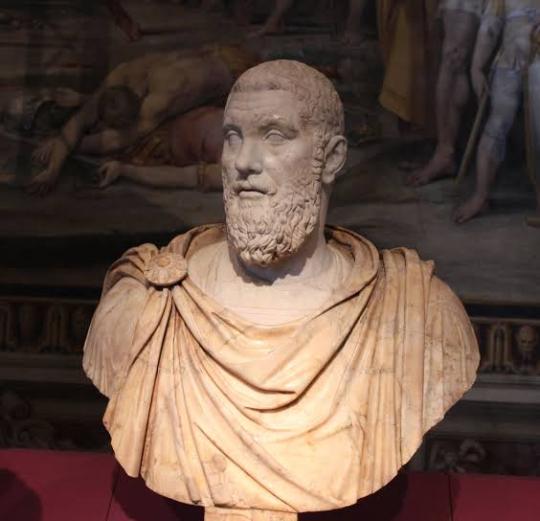
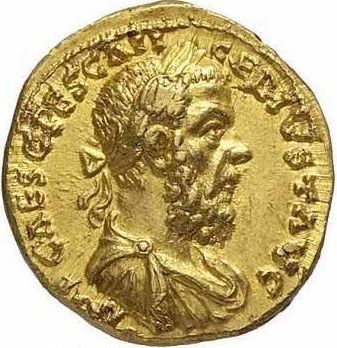
Pescennius Niger, (A.D. 135-194), Roman emperor.
"In stature Niger was tall, in appearance attractive; and his hair grew back in a graceful way toward the crown of his head. His voice was so penetrating that when he spoke in the open he could be heard a thousand paces away, if the wind were not against him. His countenance was dignified and always somewhat ruddy; his neck was so black that many men say that he was called Niger on this account. The rest of his body, however, was very white and he was inclined to be fat."
"Now when the confusion in the state was at its height, inasmuch as it was made known that there were three several emperors, Septimius Severus, Pescennius Niger, and Clodius Albinus, the priest of the Delphic Apollo was asked which of them as emperor would prove of most profit to the state, whereupon, it is said, he gave voice to a Greek verse as follows:
"Best is the Dark One, the African good, but the worst is the White One."
And in this response, it was clearly understood that Niger was meant by the Dark One, Severus by the African, and Albinus by the White One. Thereupon the curiosity of the questioners was aroused, and they asked who would really win the empire. To this the priest replied with further verses somewhat as follows:
"Both of the Black and the White shall the life-blood be shed all untimely.
Empire over the world shall be held by the native of Carthage."
And then when the priest was asked who should succeed this man, he gave answer, it is said, with another Greek verse:
"He whom the dwellers above have called by the surname of Pius."
But this was altogether unintelligible until Bassianus took the name Antoninus, which was Pius' true surname. And when finally, they asked how long he should rule, the priest is said to have replied in Greek as follows:
"Surely with twice ten ships he will cleave the Italian waters,
Only let one of his barques bound o'er the plain of the sea.""
-Historia Augusta, Life of Pescennius Niger
"This proved to be the greatest disaster of the war; for twenty thousand of Niger's followers perished. And this evidently was the meaning of the priest's dream. It seems that while Severus was in Pannonia the priest of Jupiter in a dream saw a black man force his way into the emperor's camp and come to his death by violence; and by interpreting the name of Niger people recognized that he was the black man in question. Upon the capture of Antioch not long after this, Niger fled from there toward the Euphrates, intending to make his escape to the barbarians; but his pursuers overtook him and cut off his head. Severus caused the head to be sent to Byzantium and to be set up on a pole, that the sight of it might induce the Byzantines to join his cause. After this he proceeded to punish those who had belonged to Niger's party."
-Cassius Dio, Roman History, Epitome of Book LXXV
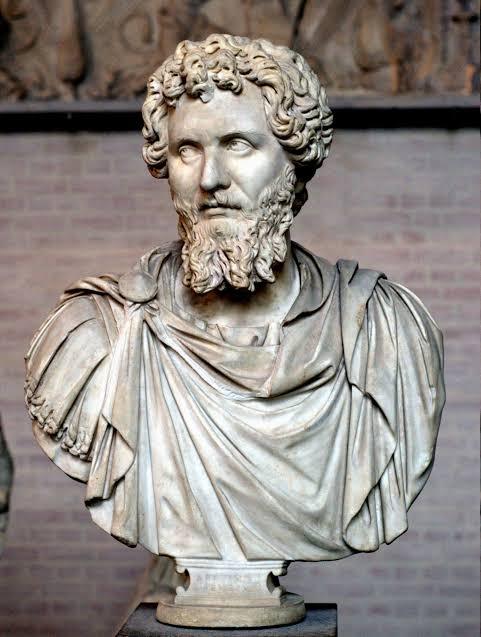
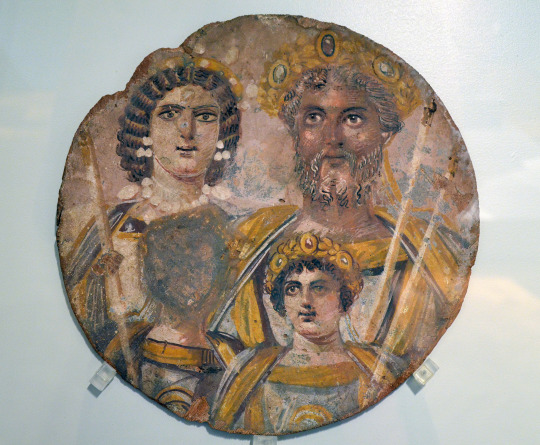
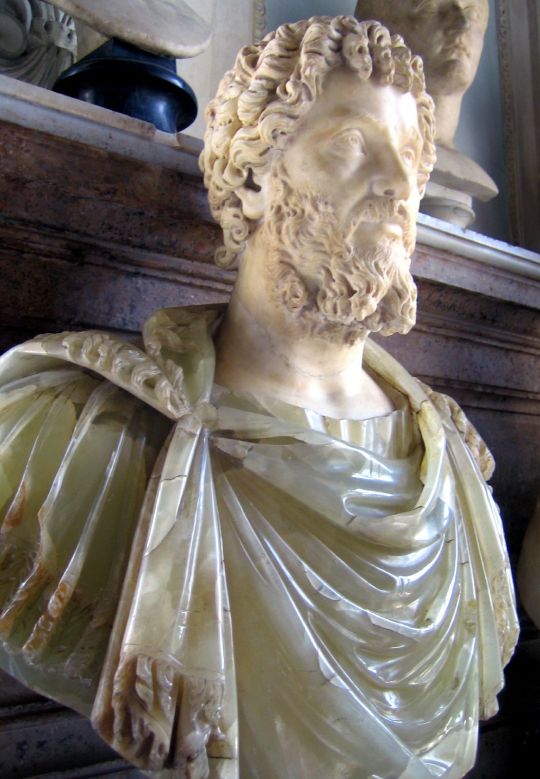
Septimius Severus, (C.E. 145-211), Roman politician and emperor, born in the city of Leptis Magna in Libya under Roman province in North Africa, and son of a Punic father and a Roman Italian mother.
Noted: He had rivalry with other Roman emperors, such as Pescennius Niger, during the Year of the Five Emperors.
When he was governor of Gaul, he married a Syrian-born Julia Domna, who was also an empress. The two bear two sons; Caracalla and Geta.
Septimius began his progress to become emperor by assassinated the dissolute ruler, Commodus in 192 C.E., but Pertinax immediately succeeded as emperor, which caused an enraged mutiny among the Praetorian Guards, and they assassinated him when he tried to bribe them. Didius Julianus proclaimed emperor when the throne put in auction to the highest bidder who is willing to pay the supporting of the Praetorian Guards. The Roman population was not happy at this scandalous affair, which eventually emerged an open challenge to Julianus's rule by three candidates. In this case, this started the Year of the Five Emperors.
In 195 C.E., Septimius gone to war with the Parthian Empire and claimed victory when conquered northern Mesopotamia.
While constructing his hometown Leptis Magna in Libya, the Roman frontier was attacked by Berber tribe, Garamantes. So, Septimius launched a campaign in northwestern Africa against them, drove them deep into the rural desert as he captured their capital. He also expanded more frontiers at that region.
Here is something interesting. While there are some resources of scholars concerning diversity in history and ancient civilization, especially when it comes to describing someone's physical appearance, there are some sources that Septimius Severus had a dark skin complexion. Some scholars denied his appearance even though there are unhidden facts that he could be a brownish skinned man. I, myself, can confirm that his complexion is dark, but not as dark as the color black. I can describe that his skin tone as the color of some furniture made of wood or describing what kind of shade his appearance is. I wouldn't know, honestly, nobody could be certain consider that he has mixed ancestry of Punic and Roman Italian. Let's get to the point. According to Historia Augusta, while Septimus expecting the construction progress of the wall of Luguvallum in Britain, he met an Ethiopian jester. He angrily ordered his men to remove from his sight. Septimius was probably disgusted by his garland fashion. The Ethiopian replied to him, by the way of jest, saying "You have been all things, you have conquered all things, now, O conqueror, be a god."
Here is something when it gets weird, when arriving in a town, he wished to perform a sacrifice as he is misunderstood on part of the rustic soothsayer, he was taken into the temple of Bellona, and, at other places, the victims were black. Septimus was disgusted at this, so he left and returned to the palace. He had the black victims be part of the attendants, followed him to the very doors, despite, however, he didn't care. You can read this part here, on passage 22.
Well, that's it for Septimus Severus, let's look up more persons.
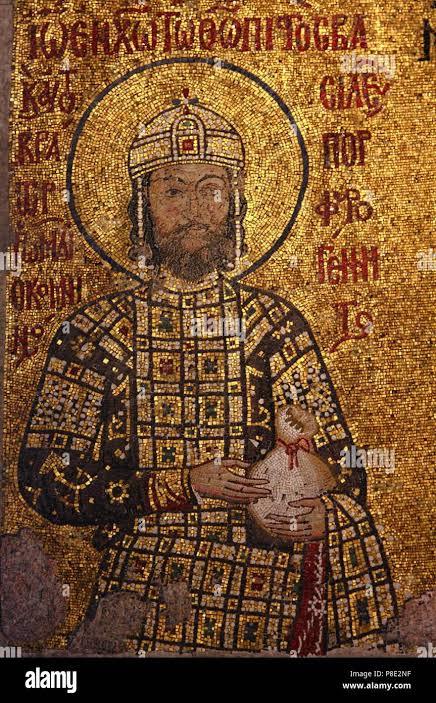
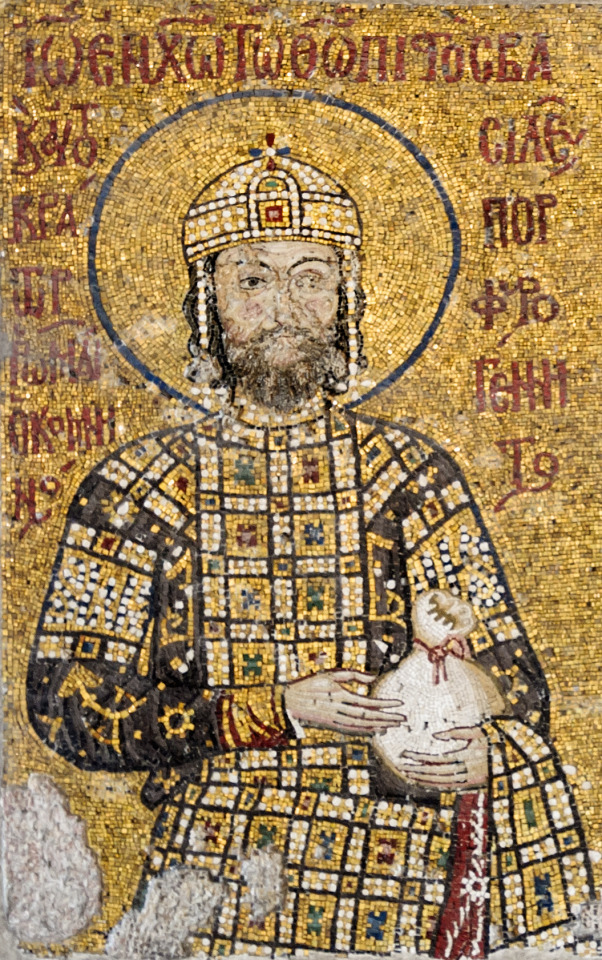
John II Komnenos, (C.E. 1087-1143), emperor of the Byzantine Empire (Eastern Roman Empire), son of Alexios I Komnenos and Irene Doukaina. His nickname: "the Handsome".
Here is some source of my research according to this:
John's nickname of "the handsome" and his general character is explained as follows by the historian J. J. Norwich: "Even his admirers admitted that he was physically ill-favoured, with hair and complexion so dark that he was known as 'the Moor'. He had, however, another nickname too: Kaloiannis, 'John the Beautiful'. This was not intended ironically; it referred not to his body, but to his soul. Levity he hated: luxury he frowned upon. Today most of us would find him an insufferable companion; in twelfth-century Byzantium he was loved. First of all, he was no hypocrite. He was genuine, his integrity complete. Second, there was a gentle, merciful side to his nature that in his day was rare indeed. He was generous, too: no Emperor ever dispensed charity with a more lavish hand." (266-7)
You can read these informations here.
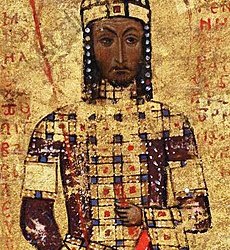
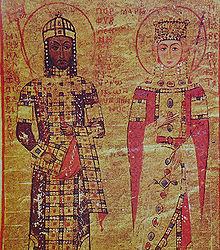
Manuel I Komnenos (C.E. 1118-1180), son of John II Komnenos and ruled the Byzantine Empire after his father.
In case you're wondering that woman on the right picture is his wife, Maria of Antioch.
As most people already knew that there were black people southern parts of Europe in the medieval era as there were in Ancient Greece and Rome, there should be evidence like archaeological material things that they contributed like every civilization in the world. If there are some ruins left over there, there should be written manuscripts and paintings on walls and vases. There should be some portrait paintings still laying in very old abandoned houses or castles. In this case, you would also find some Moorheads on the knight shields, flags, and on signs hanging above the entrance of taverns.
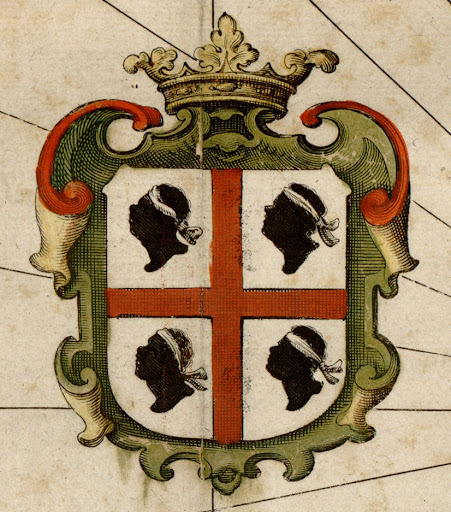
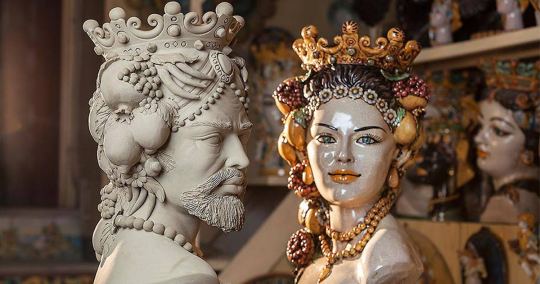
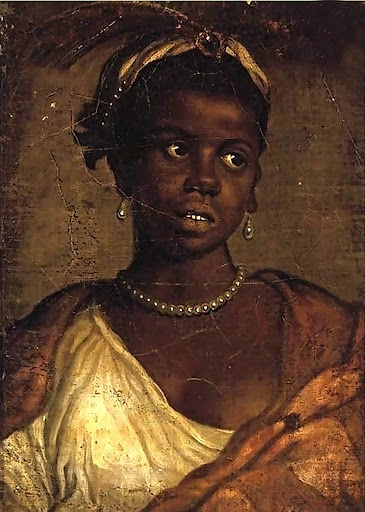
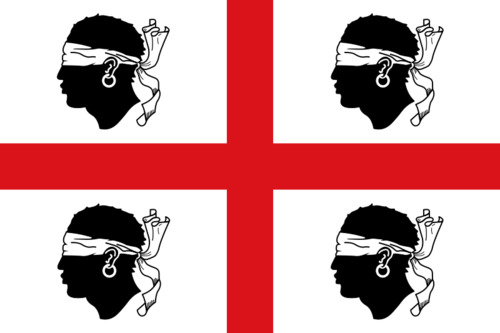
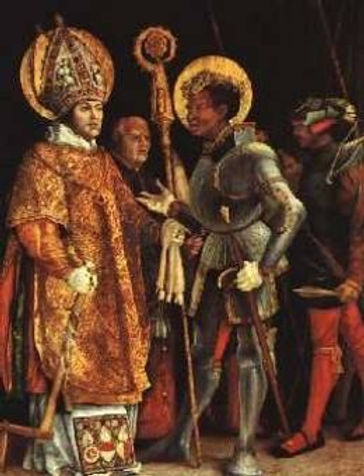
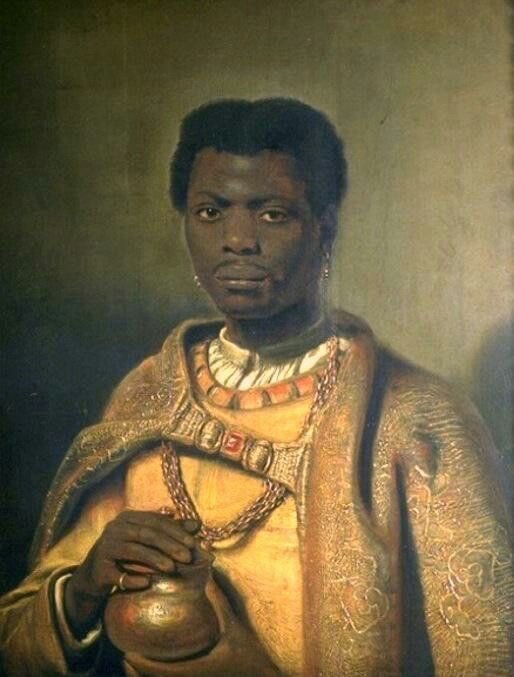
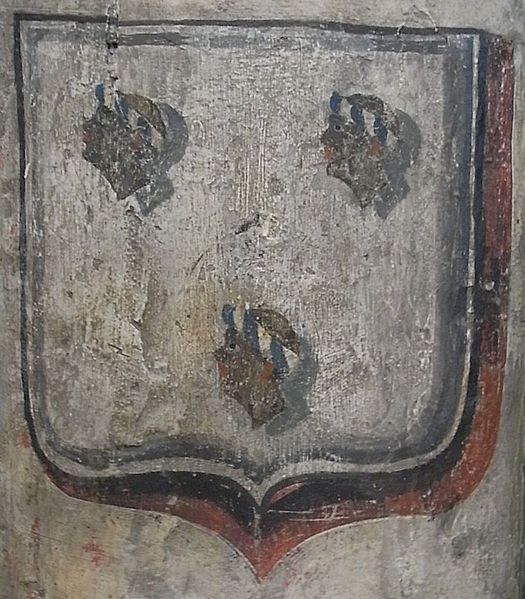

According to most historians concerning the medieval history of Spain and Portugal, the moors conquered Hispania in 711 C.E. and was probably the first region that ever conquered by them before Sicily as since these regions are to Northern Africa. Even this historical event is true, most people don’t believe the moors are black. When they think about moors, they think about Arabs and Muslims. Well, they’re right on that part, and I honestly don’t think that all moors are black, even I believe there were black people in medieval Europe, but there were black people among the moors and they could be called black moors. Moorish people could be comprised of multiple people from Northern Africa and Western Asia or Middle East. In the Moorish conquered lands of Europe, the population could be diverse, composed of Gothic tribes of the Germanic people (whom I believe they’re tribe of white people), Arabs, Berbers (Amazigh that they called themselves) Romans, Greeks, Jews, black moors or negroes.
I don’t think black people in the Middle Age never called themselves black, negroes, nor moors, such black is just color, it not a race, nation, or tribe. You should know that not everyone in Africa are not the same people consider it's just a continent. Same thing with Europe, especially in the Roman Empire as there were different ethnicities among this empire; most people there can trace their origin of their kind. Most blacks can trace their origin while some of them don’t. Probably they don't know who they really are. I can conclude that most of them can trace their origins outside being labeled as by other people, most of blacks believed they’re originated from Egypt, Libya, the Phoenicians, Jerusalem, and Arabia.
In what is now called the U.K., there could be most black people settled there. They were probably labeled as Dubh Galls or Black Gentiles by the Danes while the other locals were called Finn Galls or White Gentiles. Dubh Gall also means Dark Stranger in Gaelic, maybe refer to the Danes, but more generally lowlanders. While there were different clans of Vikings, the Danes seems to be the only clan outside the rest of them, to have dark complexion. Most of them might have mixed ancestry of both Finns and Dubhs. The Danes would be labeled as outsiders or strangers as they should be the ones being look upon.
Here is a page mentioning the Danes from the book The Black Foreigners of York and White Foreigners of Dublin by Alfred P. Smyth, part of Saga book of Viking Society, vol. 19:
"In 866 the “Great Army” of Danes crossed the Humber from its base in East Anglia and captured York on the feast of All Saints. Five months later, on 21 March 867, the Danes successfully repulsed a Northumbrian attempt to regain the city. In the battle-rout which ensued the Northumbrians lost both their kings, Osbert and Ælla, and the Danes became the undisputed masters of the kingdom. Contemporary Irish annalists described the Danish assailants at York and the slayers of King Alli, as Dub Gaill or “Black Foreigners”. These Dub Gaill were so called to distinguish them from their fellow vikings and rivals the Finn Gaill or “White Foreigners” – the name applied by Irish chroniclers to the Norwegian invaders who harassed their own shores.
It is clear from other references to Scandinavian activity of the ninth and tenth centuries within Ireland that the “White Foreigners” had a predominantly Norwegian origin, and that their opposite numbers were Danes. We know from the annals that the Finn Gaill had been established in Western Scotland and Ireland before the arrival of their Dub Gaill enemies, and Scandinavian sources, together with archaeological and place-name evidence, make it clear that the earliest settlers in the West were Norsemen. The oldest Irish source which actually equates the “Black Foreigners” with Danes is the twelfth-century War of the Irish with the Scandinavians (Cogadh Gaedhel re Gallaibh) which speaks of “Danish Black Gentiles” (Duibgeinti Danarda) who tried to drive the “White Gentiles” out of Ireland in 851."
There are some hidden mentions of Blacks or their names with the word, in most different languages, black in medieval Scotland such as Kenneth the Niger and James Douglas, who was also called Black Douglas.
"The little knowledge we have is chiefly from Barbour, who tells us he was a youth, ‘bot ane litill page,’ when his father was imprisoned. Barbour has also preserved a word-portrait of his hero. He was, it is said, of commanding stature, well formed, large-boned, and with broad shoulders; his countenance was somewhat dark or swarthy, but frank and and open, set off by locks of sable hue. Courteous in manner, wise in speech, though he spoke with a slight lisp, gentle in all his actions. Terrible in battle, and at all times an enemy to everything treacherous, dishonourable or false."
-The Good Sir James Douglas, k1330 (douglashistory.co.uk)
I thought about add this paragraph for St. Patrick Day, but I'm going to add a link for you to visit this website as I'm going to share my thoughts on this subject. I think most of the Irish or Celts were pale while there are some foreigners living among them, and I think the black people also settled there in Ireland after migrating from neighboring regions such Scotland, and Hispania.
"The term 'Black Irish' has commonly been in circulation among Irish emigrants and their descendants for centuries. As a subject of historical discussion the subject is almost never referred to in Ireland. There are a number of different claims as to the origin of the term, none of which are possible to prove or disprove. 'Black Irish' is often a description of people of Irish origin who had dark features, black hair, dark complexion and eyes."
-Black Irish - Who Were The Black Irish? (ireland-information.com)
Here's my conclusion: As I am fond of world history, but history tend to be hidden. There is truth, mystery, and lies in history as, despite all that, there are hidden evidence and information. As for the blacks or black moors in ancient Europe, I found it interesting as I already knew the origins of so-called black people which it also one of the things that make acknowledge of the world as it made me neutral. Most people believe in lies as they if they rather to live in the world of lies (which it is.). I know I would get some backlash from those who disagree or accuse me of being a bigot. To make this clear, I'm not stealing history and culture from anyone, nor lying in that matter, I just sharing some facts as I did my research. I also posted links containing with information, especially from historians and scholars. I can agree or disagree. I'm not proclaiming that all Europeans were black, even I believe there were blacks living among them. You can do your research on your own, and there are links on this topic. Well, that concluded my topic, and it was hard work but it's probably worth it.
#history#ancient history#world history#medieval history#black history#black history month#ancient greece#ancient rome#byzantine empire#ireland#scotland#u.k.#england#spain#moors#moorish#europe#truth#research#evidence#archaeology#ancient#north africa#ancient celts#vikings#roman empire
9 notes
·
View notes
Text
Events 7.18 (before 1950)
477 BC – Battle of the Cremera as part of the Roman–Etruscan Wars. Veii ambushes and defeats the Roman army. 387 BC – Roman-Gaulish Wars: Battle of the Allia: A Roman army is defeated by raiding Gauls, leading to the subsequent sacking of Rome. 362 – Roman–Persian Wars: Emperor Julian arrives at Antioch with a Roman expeditionary force (60,000 men) and stays there for nine months to launch a campaign against the Persian Empire. 452 – Sack of Aquileia: After an earlier defeat on the Catalaunian Plains, Attila lays siege to the metropolis of Aquileia and eventually destroys it. 645 – Chinese forces under general Li Shiji besiege the strategic fortress city of Anshi (Liaoning) during the Goguryeo–Tang War. 1195 – Battle of Alarcos: Almohad forces defeat the Castilian army of Alfonso VIII and force its retreat to Toledo. 1290 – King Edward I of England issues the Edict of Expulsion, banishing all Jews (numbering about 16,000) from England. 1334 – The bishop of Florence blesses the first foundation stone for the new campanile (bell tower) of the Florence Cathedral, designed by the artist Giotto di Bondone. 1389 – France and England agree to the Truce of Leulinghem, inaugurating a 13-year peace, the longest period of sustained peace during the Hundred Years' War. 1507 – In Brussels, Prince Charles I is crowned Duke of Burgundy and Count of Flanders, a year after inheriting the title. 1555 – The College of Arms is reincorporated by Royal charter signed by Queen Mary I of England and King Philip II of Spain. 1723 – Johann Sebastian Bach leads the first performance of his cantata Erforsche mich, Gott, und erfahre mein Herz, BWV 136, in Leipzig on the eighth Sunday after Trinity. 1806 – A gunpowder magazine explosion in Birgu, Malta, kills around 200 people. 1812 – The Treaties of Orebro end both the Anglo-Russian and Anglo-Swedish Wars. 1841 – Coronation of Emperor Pedro II of Brazil. 1857 – Louis Faidherbe, French governor of Senegal, arrives to relieve French forces at Kayes, effectively ending El Hajj Umar Tall's war against the French. 1862 – First ascent of Dent Blanche, one of the highest summits in the Alps. 1863 – American Civil War: Second Battle of Fort Wagner: One of the first formal African American military units, the 54th Massachusetts Volunteer Infantry, supported by several white regiments, attempts an unsuccessful assault on Confederate-held Battery Wagner. 1870 – The First Vatican Council decrees the dogma of papal infallibility. 1872 – The Ballot Act 1872 in the United Kingdom introduced the requirement that parliamentary and local government elections be held by secret ballot. 1914 – The U.S. Congress forms the Aviation Section, U.S. Signal Corps, giving official status to aircraft within the U.S. Army for the first time. 1925 – Adolf Hitler publishes Mein Kampf. 1942 – World War II: During the Beisfjord massacre in Norway, 15 Norwegian paramilitary guards help members of the SS to kill 288 political prisoners from Yugoslavia. 1942 – The Germans test fly the Messerschmitt Me 262 using its jet engines for the first time. 1944 – World War II: Hideki Tōjō resigns as Prime Minister of Japan because of numerous setbacks in the war effort.
1 note
·
View note
Text
Case file 7T4B3M3T713
Birth name: Joanne Miller
Birth place: New York, NY, United States of America
Birth date: 1935. 03. 14.
Date of death: 1971. 04. 27.
Cause of death: natural organ failure, heart, during sleep
Faith(s): Christianity, Catholic sect, case 1929-current date, progressive subsect. Minor interest in nordic religions, ancient norse beliefs, Odin subsect. Minor crisis in main faith between 1942-1945 and 1963, resolved internally.
Merron-Iltsku morality score: +/-0
Notes: first such case in this past eon. Requesting former cases where the Merron-Iltsku morality score (MIMS) is on 0 or within margin of 0. Due to regulations, case can not be sent to known afterlives.
-=-=-=-=-
From: Internal Decisions of Special Cases, Afterlife department
To: Celestial Bureaucracy, Afterlife department, C-20 office
Subject: 0 MIMS score case
Content: one (1) attached file, see the end of this message.
The requested files were found and copies of the stone tablets sent to the office. The upper decisions were recorded in the event in such a case, and the case subject were granted one resurrection for figuring out a better score.
The resurrection, as it matters, in not of the regular resurrection case (see: Faiths with recursion and resurrection, section B-R), but special case ND/A case. See attached copy.
Attached documents:
New Divination/Ascension process: expanded document by Stargazer seer of the first tribes, Al-Khanti of Assyria, Johannes of Antioch, Shi Tu-han, Ivanova Slachkin and András Nagykovácsy
Short summary: in case of an MIMS score 0, the subject is to be resurrected in a new world as a divine being and let for two eons to make their choices. These choises are to be calculated by the weighted scale of the population of the created world.
In case the created world expands significantly, it is to be absorbed into the celestian bureaucracy and it's afterlives are to be accomedated for every passing being, retroactively from the start of the ND/A process' zero timeframe.
Signed: Etele of the white plains, Power That Be, Internal Decisions of Special Cases, Afterlife department
In the afterlife, people will be measured by how good or evil they are in their lifetime. You scored a perfect zero, without a single decimal points. According to the regulations, it’s illegal to send you to heaven or hell so nobody knows what to do now.
5K notes
·
View notes
Text
"The Aderet." From the Acts of the Apostles 14: 21-23.

Of all the Acts, Syria is the greatest.
"Verb ישר (yashar) means to be straight or level. Adjective ישר (yashar) means right or upright. Nouns ישר (yosher), ישרה (yeshara) and מישר (meshar) mean uprightness or straightness. Noun מישור (mishor) describes a level place or plain.
Verb אשר ('ashar) covers a decisive progression or a setting right, and is often applied to describe happiness and prosperity (right on!). This is not due to a curious coincidence but to the obvious correlation of righteousness and efficiency. Righteousness in the Biblical sense describes a solid grasp of natural law, which leads to high levels of technology, social liquidity and thus peace and prosperity.
Nouns אשר ('esher), אשר ('ashar) and אשר ('osher) mean happiness or blessedness. Nouns אשור (ashur) and אשר (ashur) mean a step, a walk or a going. The noun תאשור (te'ashur) refers to a kind of tree (a happy tree? a progressing tree?)."
To maintain Syria as Luke says, one must refer back and forth to the teachings one has learned in subsequent Mishnahs. This section says the Polemic is the Mishnah we most want to keep handy in order to remain trouble free in Syria.
The Return to Antioch in Syria
21 Paul and Barnabas preached the Good News in Derbe and won many disciples. Then they went back to Lystra, to Iconium, and on to Antioch in Pisidia.
22 They strengthened the believers and encouraged them to remain true to the faith. “We must pass through many troubles to enter the Kingdom of God,” they taught.
23 In each church they appointed elders, and with prayers and fasting they commended them to the Lord, in whom they had put their trust.
Recall the closing is something called Antioch, a fully functioning kind of empire called a commonwealth. The reason we refer to commonwealth is it provides an economic bond between states, one that is administered by a longitudinal government. Short term presidencies featured in most of the world fail miserably at implementing lasting changes. Their owners clearly care very little about ecomomic ups and downs, wars, scarcity, the poor, as soon as they are sworn in, these are already someone else's problem in a few short years.
An Emperor or a King has to hold the reins his entire life. He or she does not want war, poverty, economic downturns, nothing must threaten the peace or prosperity under the Eye as love it or not, he will have to fix it. Presidents plan for a few years, Emperors plan their entire lives.
The Church plays a critical role in the plan. A moral, ethical, charitable, and equitable church community supposedly can produce the best conditions within which to raise secure children and well adjusted adults. This, like the job of the Emperor is lifelong.
Luke explains how this mixture of money, values, power, prestige, ad principals works in this and the following section.
The Values in Gematria are:
The Return to Antioch in Syria=1608, ט״זקח, telavizkach, "watch yourself on TV."
When you watch the news these days what do you see? Do you see commowealth or misery from sea to shining sea? Do you hear all the speculation as to what we are going to about it? And feel like someone just soaked your balls in ice water? This is because our problems do not actually have solutions. We are not supposed to be having these problems, that is why.
Read on:
v.21: Paul and Barnabas preached the Good News. The Number is 7695, עוץה, avtzah, "clear, fresh and pure."
The answer to all of life's troubles is called ceremonial cleanliness. Society cannot continually be addressing the problems of individuals. Neither can the temple. Both were made by God to empower the individual to outgrow his creature like impulses and achieve Shabbat.
Right now the entire planet wants to know what to do about a possible nuclear war with Russia instead of the latest show on Broadway, or the next superhero movie, or tour by their favorite musician or sports team. These are the theaters the Polemic says for whose purposes are to prepare and gather. But we have chosen a war instead.
v. 22: The strengthened the believers, teaching we must pass through our troubles. The Number is 8422, ףדךב, padakob, "say farewell to the cub", "redemption in the cave of science."
Children need to be raised in a way that is very strict, in the very best environments. The young people of this era, the ones that survive do not need a war story to tell later in life in order to express their gratitude to God for their survival. They should be thanking their teachers instead.
v. 23: In each church they appointed elders. The Number is 7429, עדךט, adret, "the overcoat of glory."
The Hebrew word "אדרת" (aderet) translates to "glory" or "cloak". Specifically, it can mean "glory" as in Ezekiel 17:8 or "cloak" in a figurative sense, as seen in 1 Kings 19:13 and Micah 2:8.
To stand before God in all of one's glory one must wash one's hands. One must not have an outer identity that is disreputible or uncouth, nor can one appear to be Kedosh, ceremonially clean but retain thoughts and desires that would lead one to betray God. The Church Temple is our vehicle for continually washing the hands. During no other time do we ask God, from Whom all desires are not hid to make us honest. This is how as Luke says we see ourselves on TV.
The final Gemara is ט״זקחעוץהףדךבעדךט, telavizkachavtshehephadechbeadechat, telaviz kachavtsh ehephade chbeadechat, "Your TV will come out or you will be scared but you know now."
God is right, you do not want to see yourself on the TV. The TV was never meant to give us the Good News. For that, and for the sake of the general welfare, study the Torah instead if you want to know what you look like.
0 notes
Text
DAILY SCRIPTURE READINGS (DSR) 📚 Group, Tue May 13th, 2025 ...Tuesday of the Fourth Week of Easter, Year C
Reading I
---------
Acts 11:19-26
Those who had been scattered by the persecution
that arose because of Stephen
went as far as Phoenicia, Cyprus, and Antioch,
preaching the word to no one but Jews.
There were some Cypriots and Cyrenians among them, however,
who came to Antioch and began to speak to the Greeks as well,
proclaiming the Lord Jesus.
The hand of the Lord was with them
and a great number who believed turned to the Lord.
The news about them reached the ears of the Church in Jerusalem,
and they sent Barnabas to go to Antioch.
When he arrived and saw the grace of God,
he rejoiced and encouraged them all
to remain faithful to the Lord in firmness of heart,
for he was a good man, filled with the Holy Spirit and faith.
And a large number of people was added to the Lord.
Then he went to Tarsus to look for Saul,
and when he had found him he brought him to Antioch.
For a whole year they met with the Church
and taught a large number of people,
and it was in Antioch that the disciples
were first called Christians.
Responsorial Psalm
----------------
Psalm 87:1b-3, 4-5, 6-7
R. (117:1a) All you nations, praise the Lord.
or:
R. Alleluia.
His foundation upon the holy mountains
the LORD loves:
The gates of Zion,
more than any dwelling of Jacob.
Glorious things are said of you,
O city of God!
R. All you nations, praise the Lord.
or:
R. Alleluia.
I tell of Egypt and Babylon
among those who know the LORD;
Of Philistia, Tyre, Ethiopia:
“This man was born there.”
And of Zion they shall say:
“One and all were born in her;
And he who has established her
is the Most High LORD.”
R. All you nations, praise the Lord.
or:
R. Alleluia.
They shall note, when the peoples are enrolled:
“This man was born there.”
And all shall sing, in their festive dance:
“My home is within you.”
R. All you nations, praise the Lord.
or:
R. Alleluia.
Alleluia
-------
John 10:27
R. Alleluia, alleluia.
My sheep hear my voice, says the Lord;
I know them, and they follow me.
R. Alleluia, alleluia.
Gospel
----------
John 10:22-30
The feast of the Dedication was taking place in Jerusalem.
It was winter.
And Jesus walked about in the temple area on the Portico of Solomon.
So the Jews gathered around him and said to him,
“How long are you going to keep us in suspense?
If you are the Christ, tell us plainly.”
Jesus answered them, “I told you and you do not believe.
The works I do in my Father’s name testify to me.
But you do not believe, because you are not among my sheep.
My sheep hear my voice;
I know them, and they follow me.
I give them eternal life, and they shall never perish.
No one can take them out of my hand.
My Father, who has given them to me, is greater than all,
and no one can take them out of the Father’s hand.
The Father and I are one.”
***
FOCUS AND LITURGY OF THE WORD
In today’s gospel from John, Jesus tells those wanting an answer from him about whether he is Christ; they want a plain answer. Jesus’s response gives me pause. He says that his sheep hear his voice. That’s my pause. I know Jesus’s voice is there, but do I let that voice get drowned out by the noise that surrounds me? Do I let my own ego, the clamor of wants and modern distractions muffle the sound of what I should be hearing from Jesus? Am I really listening to what Jesus says? Do I filter the message through what seems convenient at the moment? I will be a better person later. Tomorrow. I don’t want to think about the hard choices. I want to take the easy road.
I know Jesus loves me and forgives me. Do I do the same for my neighbor? My family? My colleagues? Do my actions in my everyday life serve as an echo of what Jesus says? Are my intentions good but are my actual responses weak? What can I do today to filter out the cacophony of temptations and distractions that keep me from hearing in my heart what God wants from me? How can I brush aside my ego, my desire to be in charge and surrender to God? How can I be still amid the clanging and banging of what seems important to really hear that voice of God?
I pray that I find that stillness today, that I listen for God’s voice and that voice reverberates in my actions and my life.
***
SAINT OF THE DAY
The Story of Our Lady of Fatima
Between May 13 and October 13, 1917, three Portuguese children–Francisco and Jacinta Marto and their cousin Lucia dos Santos–received apparitions of Our Lady at Cova da Iria near Fatima, a city 110 miles north of Lisbon. Mary asked the children to pray the rosary for world peace, for the end of World War I, for sinners, and for the conversion of Russia.
Mary gave the children three secrets. Following the deaths of Francisco and Jacinta in 1919 and 1920 respectively, Lucia revealed the first secret in 1927. It concerned devotion to the Immaculate Heart of Mary. The second secret was a vision of hell. When Lucia grew up she became a Carmelite nun and died in 2005 at the age of 97.
Pope John Paul II directed the Holy See’s Secretary of State to reveal the third secret in 2000; it spoke of a “bishop in white” who was shot by a group of soldiers who fired bullets and arrows into him. Many people linked this vision to the assassination attempt against Pope John Paul II in St. Peter’s Square on May 13, 1981.
The feast of Our Lady of Fatima was approved by the local bishop in 1930; it was added to the Church’s worldwide calendar in 2002.
Reflection
----------
The message of Fatima is simple: Pray. Unfortunately, some people—not Sister Lucia—have distorted these revelations, making them into an apocalyptic event for which they are now the only reliable interpreters. They have, for example, claimed that Mary’s request that the world be consecrated to her has been ignored. Sister Lucia agreed that Pope John Paul II’s public consecration in St. Peter’s Square on March 25, 1984, fulfilled Mary’s request. The Congregation for the Doctrine of the Faith prepared a June 26, 2000, document explaining the “third secret.”
Mary is perfectly honored when people generously imitate her response “Let it be done to me as you say” (Luke 1:38). Mary can never be seen as a rival to Jesus or to the Church’s teaching authority, as exercised by the college of bishops united with the bishop of Rome.
***
【Build your Faith in Christ Jesus on #dailyscripturereadingsgroup 📚: +256 751 540 524 .. Whatsapp】
0 notes
Text
Iconic Statues at the Louvre in Paris

The Louvre in Paris features a vast collection of renowned sculptures, ranging from antiquity through to the late 19th century. One of the distinguished pieces in the Arts of Africa, Asia, Oceania, and the Americas gallery is a Moai statue of Easter Island (Rapa Rui). This enigmatic basaltic face was quarried from the Rano Raraku volcano and was originally part of a sculpture that was likely 16 feet tall. Crafted around 1000 BC, it’s among more than 900 such monoliths situated on Easter Island, the southeastern-most point of the Polynesian triangle. Moai are thought to represent great ancestors of the seagoing culture, and were often placed on ahu, or ceremonial platforms related to burials.
Another ancient masterpiece is the Nike of Samothrace. Positioned at the top of a marble staircase, the so-called Winged Victory was carved from Parian marble around 190 BC and stands on a ship prow made of Lartos marble. An iconic example of Hellenistic Greek art, it was discovered in pieces in 1863 by Charles Champoiseau, then vice-consul in the Ottoman city Adrianople. After excavating the statue on the island of Samothrace, the amateur archaeologist had it transported to France, where it has occupied a place of honor at the Louvre since 1866.
The headless statue of Nike is nine feet tall, while the ship that serves as a pedestal is of slightly greater height. Together, they serve as a marker of naval victory (the word “nike” means “victory” in ancient Greek). The female form under wind-blown garments has a dramatic aspect, with wings outstretched, as if about to fly. While Winged Victory is made of plain white marble in its current form, it would have been painted bright when crafted. Interestingly, while the arms, feet, and head are still missing and unrestored, a surviving right hand was ultimately found at the Samothrace site in 1950. This is also on display at the Louvre, and has an outstretched gesture of greeting.
Another iconic Hellenistic marble statue at the Louvre, the Venus De Milo was crafted around 150 BC. Local farmer Yorgos Kentrotas discovered the statue in two pieces on the island of Melos in the Aegean Sea in 1820. French naval officer Olivier Voutier happened to be digging at an ancient theater in the vicinity and assisted with the excavation.
A separate inscription reveals the statue to be the creation of “Alexandros, son of Menides, citizen of Antioch.” While some identify her as Aphrodite, goddess of love and fertility (Venus to the Romans), other researchers believe the statue represents Amphitrite, Greek goddess of the sea. Soon after the statue’s discovery, Voutier presented the Venus De Milo, lacking arms but with head intact, to Louis XVIII. It has been a foundational piece of the Louvre collection since 1821.
The Louvre also contains two iconic works by Renaissance sculptor Michelangelo: The Rebellious Slave and The Dying Slave. Both were carved between 1513 and 1515 and intended for Pope Julius II’s tomb. This was the same Vatican leader who commissioned Michelangelo’s large-scale painted work on the ceiling of the Sistine Chapel. Plans for the Pope’s tomb underwent several changes, and Michelangelo was ultimately allowed to keep the unfinished marble works for his residence. Featuring contorted and sensual male figures, the statues have an immediateness that reflects their unfinished state. They still bear the marks of tools such as chisels, rasps, and hammers that would ultimately have been worked over and polished.
Michelangelo gave the statues to Luigi del Riccio in 1545, in gratitude for arranging his care at the Strozzi palace in Rome when he fell ill. In 1850, they were transported to France, where Cardinal de Richelieu had them installed at his chateau in Poitou. Interestingly, the four other slaves in the series remain in Italy, on display at Florence’s Galleria dell’Accademia.
0 notes
Text
THE BIBLE BOOK OF GOD
New Testament
2 Timothy 3
Godlessness in the Last Days
3 But understand this, that in the last days there will come times of difficulty. 2 For people will be lovers of self, lovers of money, proud, arrogant, abusive, disobedient to their parents, ungrateful, unholy, 3 heartless, unappeasable, slanderous, without self-control, brutal, not loving good, 4 treacherous, reckless, swollen with conceit, lovers of pleasure rather than lovers of God, 5 having the appearance of godliness, but denying its power. Avoid such people. 6 For among them are those who creep into households and capture weak women, burdened with sins and led astray by various passions, 7 always learning and never able to arrive at a knowledge of the truth. 8 Just as Jannes and Jambres opposed Moses, so these men also oppose the truth, men corrupted in mind and disqualified regarding the faith. 9 But they will not get very far, for their folly will be plain to all, as was that of those two men.
All Scripture Is Breathed Out by God
10 You, however, have followed my teaching, my conduct, my aim in life, my faith, my patience, my love, my steadfastness, 11 my persecutions and sufferings that happened to me at Antioch, at Iconium, and at Lystra—which persecutions I endured; yet from them all the Lord rescued me. 12 Indeed, all who desire to live a godly life in Christ Jesus will be persecuted, 13 while evil people and impostors will go on from bad to worse, deceiving and being deceived. 14 But as for you, continue in what you have learned and have firmly believed, knowing from whom you learned it 15 and how from childhood you have been acquainted with the sacred writings, which are able to make you wise for salvation through faith in Christ Jesus. 16 All Scripture is breathed out by God and profitable for teaching, for reproof, for correction, and for training in righteousness, 17 that the man of God may be complete, equipped for every good work.
2 Timothy 3
Diane Beauford
0 notes
Text
But we didn’t give in to them. We didn’t entertain their thoughts for a minute! We resisted them so the true gospel—and not some counterfeit—would continue to be available to you.
Today’s reading of the Scriptures from the New Testament is the 2nd chapter of the letter of Galatians:
As a result of a revelation, I returned to Jerusalem 14 years later; and this time Barnabas and Titus accompanied me. When I arrived, I shared the exact gospel that I preach to the outsiders. I first shared God’s truth privately with those who were people of influence and leadership because I thought if they did not embrace the freedom of my good news, then any work I had done for Jesus here and any in the past would be spoiled.
Listen carefully. None of the Jerusalem leaders insisted that Titus be circumcised, although he is Greek. Some people who were pretending to be our brothers and sisters were brought in to spy on the freedom we enjoy in the Anointed One, Jesus—their agenda was clear: they wanted to enslave us. But we didn’t give in to them. We didn’t entertain their thoughts for a minute! We resisted them so the true gospel—and not some counterfeit—would continue to be available to you.
It makes no difference to me (or to God for that matter) if people have power or influence. God doesn’t choose favorites among His children. Even the so-called pillars of the church didn’t contribute anything new to my understanding of the good news. But it quickly became obvious to them what God was doing: He had entrusted me to carry the good news to the uncircumcised, just as Peter was called to preach to those who were circumcised. God was at work in the ministry of Peter, as emissary to the Jews, and was also moving and working with me in my ministry to the outsider nations.
When James, Cephas (whom you know as Peter), and John—three men purported to be pillars among the Jewish believers—saw that God’s favor was upon me to fulfill this calling, they welcomed and endorsed both Barnabas and me. They agreed that our ministries would work as two hands, theirs advancing the mission of God among the Jews and ours toward the outsider nations, all with the same message of redemption. In parting, they requested we always remember to care for the poor among us, which was something I was eager to do.
But when Cephas came to Antioch, there was a problem. I got in his face and exposed him in front of everyone. He was clearly wrong. Here’s what was going on: before certain people from James arrived, Cephas used to share meals with the Gentile outsiders. And then, after they showed up, Cephas suddenly became aloof and distanced himself from the outsiders because he was afraid of those believers who thought circumcision was necessary.
The rest of the Jewish believers followed his lead, including Barnabas! Their hypocritical behavior was so obvious— their actions were not at all consistent with everything the good news of our Lord represents. So I approached Cephas and told him in plain sight of everyone: “If you, a Jew, have lived like the Gentile outsiders and not like the Jews, then how can you turn around and urge the outsiders to start living like Jews?” We are natural-born Jews, not sinners from the godless nations. But we know that no one is made right with God by meeting the demands of the law. It is only through the faithfulness of Jesus the Anointed that salvation is even possible. This is why we put faith in Jesus the Anointed: so we will be put right with God. It’s His faithfulness—not works prescribed by the law—that puts us in right standing with God because no one will be acquitted and declared “right” for doing what the law demands. Even though we are seeking a right relationship with God through the Anointed, the fact is we have been found out. We are sinners. But does that mean the Anointed is the one responsible for our sins? Absolutely not! If I reconstruct something I have worked so hard to destroy, then I prove myself a sinner.
The law has provided the means to end my dependence on it for righteousness, and so I died to the law. Now I have found the freedom to truly live for God. I have been crucified with the Anointed One—I am no longer alive—but the Anointed is living in me; and whatever life I have left in this failing body I live by the faithfulness of God’s Son, the One who loves me and gave His body on the cross for me. I can’t dismiss God’s grace, and I won’t. If being right with God depends on how we measure up to the law, then the Anointed’s sacrifice on the cross was the most tragic waste in all of history!
The Letter of Galatians, Chapter 2 (The Voice)
A set of notes from The Voice translation:
One of the great stories in the Bible is the transformation of Saul, the Pharisee, from a persecutor of the church to the greatest missionary that history has ever witnessed. Seldom does Paul relate that story in his letters. He doesn’t need to because he usually does that in person when he is planting a church. But on this occasion, as he defends his call and the gospel, he retells a bit of his personal history to underscore the complete metamorphosis that has taken place in his life. In his former life, Paul admits—quite painfully, no doubt—that he tried to destroy this movement. Borrowing language from the prophets, Paul narrates how God unveiled to him the truth about Jesus. At just the right moment, even while Paul was an active enemy, God revealed His Son to Paul and called him to be heaven’s emissary to the nations. Paul immediately stopped his campaign against the church, which was just beginning to emerge from its Jewish roots and spread to the Gentile nations.
Since Christianity arises from Judaism, some traveling preachers from Jerusalem think that Jewish believers must remain true to Jewish rules regarding circumcision, Sabbath observance, and kosher food. If they rigorously follow the food rules, then Jewish believers are not supposed to share a meal with “unclean” Gentile outsiders, as Peter has been doing in Antioch. They advocate that Gentile outsiders need to follow Jewish ways and practices to become full members of the family of God. Paul—and the Jerusalem council (Acts 15)—strongly reject this. The apostle argues that it is only the faithfulness of Jesus and the presence of the Spirit that serve as the foundation of the new covenant and as the entrance into the people of God.
So why all this personal history? Paul thinks it is useful because the people preaching the false gospel in Galatia claim to be operating under the authority of some of the followers of Jesus from Jerusalem, the mother church. Paul doesn’t have their pedigree and, according to them, doesn’t deserve the rank he claims as the emissary to the nations. They say that not only is Paul deficient, but his message is, too, because it doesn’t bring outsiders to follow the law. So Paul goes toe-to-toe with them, defending not only his call but also his message. The good news he preaches comes directly from the risen Jesus and is confirmed by the Jerusalem leaders.
Today’s paired reading from the First Testament is the 18th chapter of the book of Leviticus:
The Eternal One spoke to Moses.
Eternal One: Go, talk with the Israelites. Tell them I am the Eternal One, your God. You must not act as you saw the Egyptians do when you lived in Egypt, nor should you act as they do in Canaan where I am taking you. Do not follow their practices. From here on out, you will live by My commands and honor My decrees and live your lives according to them alone. I am the Eternal One, your God. Stay devoted to My decrees and commands. The person who observes them will live by them. I am the Eternal One.
You must not have sexual relations with anyone closely related to you. I am the Eternal One. This includes your father and your mother. You are to honor her as your mother and not have sexual relations with her. You are not to have sexual relations with your father’s wife; you might as well violate your father. You are not to have sexual relations with your sister—whether she is your father’s daughter or mother’s daughter, regardless of where she has lived, with your family or elsewhere. Do not have sexual relations with your son’s daughter or your daughter’s daughter; since they are your own flesh and blood, such an act would bring shame to you. You are not to have sexual relations with your stepsister, the daughter of your father and his wife; for she is still your sister. Do not have sexual relations with your father’s sister, your aunt; she is your father’s flesh and blood. Do not have sexual relations with your mother’s sister, your aunt; she is your mother’s flesh and blood. You are not to dishonor your father’s brother, your uncle, by approaching his wife for sexual relations. She is your aunt. You are not to have sexual relations with your daughter-in-law; she is your son’s wife. You are not to have sexual relations with your brother’s wife, your sister-in-law; you might as well violate your brother. You are not to have sexual relations with a woman and her daughter, her son’s daughter, or her daughter’s daughter; they are blood relations. It would be a disgusting act. As long as your wife is living, do not marry her sister or have sexual relations with her. This would make them rivals.
You are not to have sexual relations with a woman while she is in her menstrual impurity. Do not have sexual relations with your neighbor’s wife; such an act defiles you both. Do not sacrifice your children to Molech. Such an unholy sacrifice desecrates your God’s name. I am your God, the Eternal One. You are not to have sexual relations with a man in the same way you do with a woman; such a thing is detestable. Do not engage in a sexual act with an animal—this includes men as well as women; such behavior defiles you and perverts the proper order of things.
Do not defile yourselves by engaging in any of these perverse things. I am driving out all these other nations ahead of you because they have corrupted themselves with disgusting acts like these. The entire land of Canaan is so impure that I will punish the land until it vomits out those who dwell upon it. I want you to keep My decrees and judgments. No Israelite and no outsider living among you should commit any of the detestable acts that the people who were in Canaan before you committed when they desecrated the land. Do not desecrate the land or the land will vomit you from it as it has done to those who were there before you. All those who commit these disgusting acts will be cut off from their community. Therefore, observe My laws and do not commit any of these disgusting acts which have been committed by the people who lived in the land before you. If you observe them, you will not defile yourselves like they did. I am the Eternal One, your God.
The Book of Leviticus, Chapter 18 (The Voice)
A link to my personal reading of the Scriptures for Tuesday, june 18 of 2024 with a paired chapter from each Testament (the First & the New Covenant) of the Bible along with Today’s Proverbs and Psalms
A post by John Parsons:
"The essence of optimism is that it takes no account of the present, but it is a source of inspiration, of vitality and hope where others have resigned; it enables a man to hold his head high, to claim the future for himself and not to abandon it to his enemy." - Dietrich Bohhoeffer.
====
From our Torah this week (i.e., Beha'alotekha) we read: "At the command of the LORD they camped, and at the command of the LORD they set out" (Num. 9:23). This teaches us that God's Name is to be heeded every step of the way.
Whenever we journey someplace, near or far, say, "With God's help (i.e., be’ezrat ha’shem: בעזרת השם) I am going to this place, and I will stay for so long, if it pleases God (i.e., im yirtzei ha’shem: אם ירצה השם)." As James reminds us, "You do not know what tomorrow will bring. For what is your life? You are a mere mist that appears for a little time and then vanishes (James 4:14-15). "Man is like a breath; his days are like a passing shadow" (Psalm 144:4).
We share exile with the LORD in this age, as strangers and sojourners with Him; indeed, our lives are “hidden with Him,” waiting to be revealed (Col. 3:1-4; Psalm 17:15). "The present form (τὸ σχῆμα) of this world is passing away" (1 Cor. 7:31), and the heart of faith looks for a city whose designer and builder is God Himself (Heb. 11:10). "So we do not lose heart, though our outer self is wasting away... For the things that are seen are turning to dust, but the things that are unseen shall endure forever" (2 Cor. 4:16-18).
"In all your ways know Him," that is, in all that you put your hand to do respect the Lord and ask for divine guidance (1 Cor. 10:31). As King David stated, Shiviti: "I have set the Lord always before me, because He is at my right hand, I shall not be moved" (Psalm 16:8). "Do do be wise in your own eyes, fear the LORD and turn away from evil" (Prov. 3:7).
[ Hebrew for Christians ]
========
Prov. 3:6 reading:
https://hebrew4christians.com/Blessings/Blessing_Cards/prov3-6-jjp.mp3
Hebrew page:
https://hebrew4christians.com/Blessings/Blessing_Cards/prov3-6-lesson.pdf

6.18.24 • Facebook
from yesterday’s email by Israel365
Today’s message (Days of Praise) from the Institute for Creation Research
0 notes
Text

11th May >> Mass Readings (Except USA)
Saturday before Ascension Sunday.
(Liturgical Colour: White. Year: B(II))
First Reading Acts of the Apostles 18:23-28 Apollos demonstrated from the scriptures that Jesus was the Christ.
Paul came down to Antioch, where he spent a short time before continuing his journey through the Galatian country and then through Phrygia, encouraging all the followers.
An Alexandrian Jew named Apollos now arrived in Ephesus. He was an eloquent man, with a sound knowledge of the scriptures, and yet, though he had been given instruction in the Way of the Lord and preached with great spiritual earnestness and was accurate in all the details he taught about Jesus, he had only experienced the baptism of John. When Priscilla and Aquila heard him speak boldly in the synagogue, they took an interest in him and gave him further instruction about the Way.
When Apollos thought of crossing over to Achaia, the brothers encouraged him and wrote asking the disciples to welcome him. When he arrived there he was able by God’s grace to help the believers considerably by the energetic way he refuted the Jews in public and demonstrated from the scriptures that Jesus was the Christ.
The Word of the Lord
R/ Thanks be to God.
Responsorial Psalm Psalm 46(47):2-3,8-10
R/ God is king of all the earth. or R/ Alleluia!
All peoples, clap your hands, cry to God with shouts of joy! For the Lord, the Most High, we must fear, great king over all the earth.
R/ God is king of all the earth. or R/ Alleluia!
God is king of all the earth, sing praise with all your skill. God is king over the nations; God reigns on his holy throne.
R/ God is king of all the earth. or R/ Alleluia!
The princes of the people are assembled with the people of Abraham’s God. The rulers of the earth belong to God, to God who reigns over all.
R/ God is king of all the earth. or R/ Alleluia!
Gospel Acclamation
Alleluia, alleluia! The Lord, who hung for us upon the tree, has risen from the tomb. Alleluia!
Gospel John 16:23-28 The Father loves you for loving me and believing that I came from God.
Jesus said to his disciples: ‘I tell you most solemnly, anything you ask for from the Father he will grant in my name. Until now you have not asked for anything in my name. Ask and you will receive, and so your joy will be complete. I have been telling you all this in metaphors, the hour is coming when I shall no longer speak to you in metaphors; but tell you about the Father in plain words. When that day comes you will ask in my name; and I do not say that I shall pray to the Father for you, because the Father himself loves you for loving me and believing that I came from God. I came from the Father and have come into the world and now I leave the world to go to the Father.’
The Gospel of the Lord
R/ Praise to you, Lord Jesus Christ.
0 notes
Text
Events 10.21 (before 1950)
1096 – A Seljuk Turkish army successfully fights off the People's Crusade at the Battle of Civetot. 1097 – First Crusade: Crusaders led by Godfrey of Bouillon, Bohemund of Taranto, and Raymond IV, Count of Toulouse, begin the Siege of Antioch. 1392 – Japanese Emperor Go-Kameyama abdicates in favor of rival claimant Go-Komatsu. 1512 – Martin Luther joins the theological faculty of the University of Wittenberg. 1520 – João Álvares Fagundes discovers the islands of Saint Pierre and Miquelon, bestowing them their original name of "Islands of the 11,000 Virgins". 1600 – Tokugawa Ieyasu defeats the leaders of rival Japanese clans in the Battle of Sekigahara and becomes shōgun of Japan. 1774 – The flag of Taunton, Massachusetts is the first to include the word "Liberty". 1797 – In Boston Harbor, the 44-gun United States Navy frigate USS Constitution is launched. 1805 – Napoleonic Wars: A British fleet led by Lord Nelson defeats a combined French and Spanish fleet under Admiral Villeneuve in the Battle of Trafalgar. 1824 – Portland cement is patented. 1854 – Florence Nightingale and a staff of 38 nurses are sent to the Crimean War. 1861 – American Civil War: Union forces under Colonel Edward Baker are defeated by Confederate troops in the second major battle of the war. 1867 – The Medicine Lodge Treaty is signed by southern Great Plains Indian leaders. The treaty requires Native American Plains tribes to relocate to a reservation in the western Indian Territory. 1879 – Thomas Edison applies for a patent for his design for an incandescent light bulb. 1888 – The Swiss Social Democratic Party is founded. 1892 – Opening ceremonies for the World's Columbian Exposition are held in Chicago, though because construction was behind schedule, the exposition did not open until May 1, 1893. 1895 – The capitulation of Tainan completes the Japanese conquest of Taiwan. 1907 – The 1907 Qaratog earthquake hits the borders of Uzbekistan and Tajikistan, killing between 12,000 and 15,000 people. 1910 – HMS Niobe arrives in Halifax Harbour to become the first ship of the Royal Canadian Navy. 1912 – First Balkan War: The Greek navy completes the capture of the island of Lemnos for use as a forward base against the Dardanelles. 1921 – President Warren G. Harding delivers the first speech by a sitting U.S. president against lynching in the Deep South. 1931 – A secret society in the Imperial Japanese Army launches an abortive coup d'état attempt. 1940 – The first edition of the Ernest Hemingway novel For Whom the Bell Tolls is published. 1941 – World War II: The Kragujevac massacre against Serbian men and boys takes place. 1943 – World War II: The Provisional Government of Free India is formally established in Japanese-occupied Singapore. 1944 – World War II: The first kamikaze attack damages HMAS Australia as the Battle of Leyte Gulf begins. 1944 – World War II: The Nemmersdorf massacre against German civilians takes place. 1944 – World War II: The city of Aachen falls to American forces after three weeks of fighting, the first German city to fall to the Allies. 1945 – In the 1945 French legislative election French women vote for the first time.
1 note
·
View note